#Vladimir Lukyanov
Text
Most of the time, when heads of state talk about nuclear war, they speak in careful, measured tones, acknowledging the gravity of the nuclear taboo and the consequences of breaking it. The Russian president takes a different approach. Speaking at his annual foreign-policy conference a few years ago, Vladimir Putin reflected, without smiling, on the consequences of a nuclear war. “We will go to heaven as martyrs,” he said, “and they will just drop dead.”
At the same conference last month, a regime insider, Fyodor Lukyanov, asked him about this remark: “You said that we would all go to heaven, but we’re in no hurry to get there, right?” Putin did not answer. The seconds ticked by. Lukyanov said, “You’ve stopped to think. That’s disconcerting.” Putin responded, “I did it on purpose to make you worry a little.”
I did it on purpose to make you worry a little? Why does he want anyone to worry? Because fear is not just a feeling or an ephemeral emotion; it is a physical sensation. It can grip your stomach, freeze your limbs, make your heart beat faster. Fear can distort the way you think and act. Because it can be so paralyzing, human beings have always tried to make other human beings feel fear. If you can make your enemies afraid, they will not oppose you, because they cannot oppose you. You can then win the argument, the battle, or the war without ever having to fight.
Putin is a KGB officer who knows about the manipulation of emotions, fear most of all. For two decades, he has sought to evoke fear inside Russia. Unlike his Soviet predecessors, he doesn’t shoot or arrest millions of people. Instead, he uses targeted violence, specially designed to create fear. When the investigative reporter Anna Politkovskaya was gunned down in her Moscow stairwell, and when the businessman Mikhail Khodorkovsky was sent to prison for a decade, other journalists and other businessmen got the message. When the opposition politicians Boris Nemtsov and Alexei Navalny were murdered and poisoned, respectively, those incidents sent a message too. This isn’t mass terror, but it is just as effective. Fear keeps Putin in power by rendering people too frightened to report news, protest government actions, or conduct independent business or even independent activity of any kind.
Putin also seeks to create fear in the outside world, especially the democratic world. He does this, above all, by bantering about nuclear weapons, at conferences and everywhere else. Indeed, this has been a central subject of his public commentary, and of Russian propaganda more broadly, for many years. Pictures of mushroom clouds appear regularly on the evening news. Threats of nuclear strikes against Ukraine have been made repeatedly, as far back as 2014. Russia’s armed forces practice nuclear strikes as a routine part of military exercises. Back in 2009, they played out a war game that included dropping a nuclear bomb on Poland. This constant, repetitive nuclear signaling, which long predates the current war, has a purpose: to make NATO countries afraid to defend Poland, afraid to defend Ukraine, and afraid to provoke or anger Russia in any way at all.
— Fear of Nuclear War Has Warped the West’s Ukraine Strategy
#anne applebaum#fear of nuclear war has warped the west’s ukraine strategy#current events#warfare#nuclear warfare#politics#russian politics#psychological warfare#psychology#totalitarianism#russo-ukrainian war#2022 russian invasion of ukraine#russia#ukraine#poland#vladimir putin#fyodor lukyanov#anna politkovskaya#mikhail khodorkovsky#alexei navalny#boris nemtsov#kgb#nato
10 notes
·
View notes
Photo


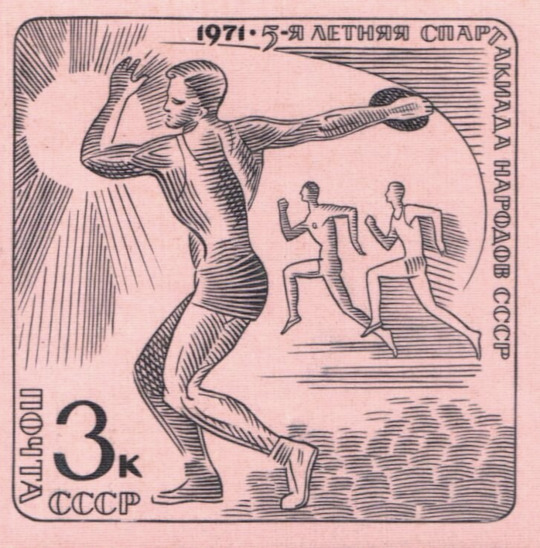


Postage stamps commemorating the 5th Summer Peoples’ Spartakiad, USSR, 1971
Designed by Miron Vladimirovich Lukyanov, with engravers I. Zagurnov, Vladimir Smirnov, Ivan M. Mokrousov, Tatania Nikitina, and Vladimir Mochalov
23 notes
·
View notes
Text

Vladimir Sergeevich Lukyanov built the world's first computer in 1936 that solved differential equations in partial derivatives. The amazing fact is that the machine was driven by water.
The construction company that Lukyanov worked with was unable to find a solution for the cracks that used to happen in concretes during winter's sub-zero temperatures. To understand the thermal process better, Lukyanov researched the temperature conditions in concrete masonry.
For More details & Information
🌐Visit Us: https://www.mavengroup.in/
📧Email: [email protected]/
📞Phone: +91 99665 92424
#factsdaily#factsonly#webdevelopment#appdevelopment#webandappdevelpment#websitedevelopment#websitebuilder#applicationdesign#webdesign#ecommercewebsite#ecommerceapplications#ecommercewebsitedesigning#itservices#seo#smm#socialmediamarketing#smmarketing#digitalmarketing#digitalservices#websitecreation#mavengroupglobal#habsigudastreetno8#Hyderabad
0 notes
Text
Gideon Rachman is chief foreign affairs columnist for the Financial Times and the 2016 winner of the Orwell Prize for Journalism. Even when I don't entirely agree with him I find his writing insightful.
In this column (archived) he compares France's 7.5 year colonial war in Algeria with Russia's neocolonial invasion of Ukraine.
Some excerpts...
France cannot be France without greatness,” wrote Charles de Gaulle in the opening of his memoirs. His nation, he insisted, must always be in “the first rank”.
Vladimir Putin feels the same way about Russia. Back when I was still able to visit that country, Fyodor Lukyanov — a foreign policy thinker close to Putin — told me that the Russian president was driven by the fear that his nation might permanently lose its status as a great power.
That fear and paranoia reached its tragic apogee with the full-scale invasion of Ukraine in 2022. But instead of restoring Russian national grandeur, Putin’s war has disgraced and isolated his nation.
Unlike Putin, de Gaulle’s belief in national greatness did not depend on the subordination of a neighbour. He ended France’s war in Algeria and accepted Algerian independence in 1962. By contrast, even after 30 years of Ukrainian independence, Putin could not accept Ukraine’s right to shape its own destiny.
Nobody would accuse the late President Charles de Gaulle of being soft on French patriotism; he had been the leader of the Free French forces during World War II. But de Gaulle had the sense to see that France was in a no-win situation in Algeria and this was leading to deep divisions in France itself. There was even a failed insurrection against de Gaulle by some French generals after he had entered into negotiations with the Algerian independence movement.
Algeria became independent in 1962 despite bitter opposition by some in France. Resistance was punctuated by acts of terrorism perpetrated by ethnic French former residents of Algeria. But de Gaulle knew that no matter how much disorder would ensue, saying good-bye to Algeria was the best option in the long run for France.
Where de Gualle decided to look to the future, Putin gradually sinks in the quicksand of the past. De Gaulle said adieu to colonialism but Putin refuses to say до свидания to neocolonialism.
As Gideon Rachman says in his FT piece...
Freed of its colonial burden in Algeria, France was able to forge a new future. Modern France is not a superpower, but it remains a leader in Europe. It is a global player in culture, diplomacy, business, sport and military affairs. France retains some of the badges of great-power status, such as nuclear weapons and a permanent seat on the UN security council. But its grandeur today rests on culture and the global respect it inspires, rather than on raw power or territory.
Putin, by contrast, was unable to imagine Russia as a post-imperial power. He still defines Russian greatness through his country’s ability to control territory and inspire fear. It was de Gaulle who was born in the 19th century, but it is Putin who clings to a 19th-century imperialistic view of national grandeur.
In the 21st century, however, the bloodbath that Putin has unleashed in Ukraine has inspired disgust rather than admiration in the rest of Europe, isolating Russia from its neighbours and reducing its influence in the wider world.
[ ... ]
Putin has been unable to separate his vision of national grandeur from his personal power and wealth. He clings on in the Kremlin. Those who disagree with his policies are beaten up in the streets, imprisoned, driven into exile or die in suspicious circumstances. Russia needed its own de Gaulle. Instead, it has ended up with a pale imitation of Ivan the Terrible.
Perhaps a Russian version of de Gaulle would be good, but a Russian version of Atatürk would be better. Somebody needs to drag Russia, screaming and kicking, from the 18th century into the 21st century.
#invasion of ukraine#gideon rachman#vladimir putin#neocolonialism#ukraine#charles de gaulle#algeria#colonialism#algerian war of independence#россия#владимир путин#путин хуйло#путлер#агрессивная война россии#неоколониализм#военные преступления#нет войне#путин – это лжедмитрий iv а не пётр великий#геть з україни#вторгнення оркостану в україну#україна переможе#будь сміливим як україна#слава україні!#героям слава!
1 note
·
View note
Photo

Vladimir Lukyanov's computer was the first in the world that could solve partial differential equations.
2 notes
·
View notes
Text
"In 1936, Russian scientist Vladimir Lukyanov created a computer that ran on water. [He] created the first computer for solving partial differential questions. He would use a series of water-filled glass tubes to get the correct answers."
Lol this sounds like an ancient Greek experiment...
7 notes
·
View notes
Text
Putin Has Never Lost a War. Here Is How He'll Win In Ukraine
— By Bill Powell | Saturday February 26, 2022 | Newsweek Magazine
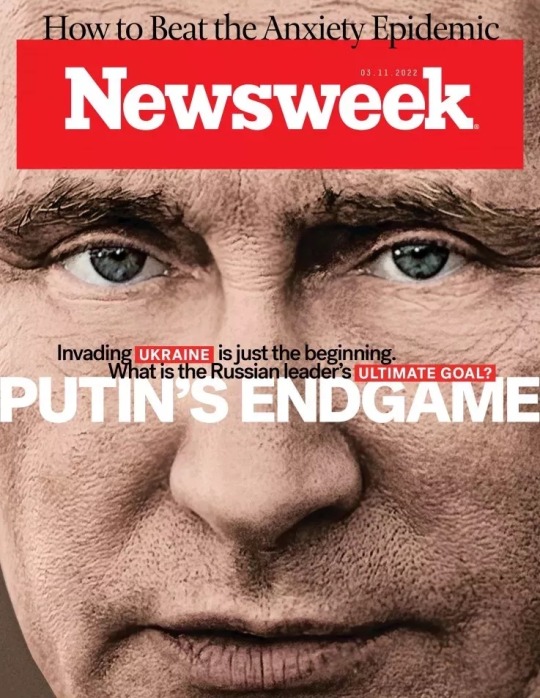
As the battle of wills and might between Russia and the west over the fate of Ukraine unfolds, there is one key fact to bear in mind: Vladimir Putin has never lost a war. During past conflicts in Chechnya, Georgia, Syria and Crimea over his two decades in power, Putin succeeded by giving his armed forces clear, achievable military objectives that would allow him to declare victory, credibly, in the eyes of the Russian people and a wary, watching world. His latest initiative in Ukraine is unlikely to be any different.
Despite months of military build-up along Ukraine's borders and repeated warnings from the Biden administration that an incursion could happen at any time, the February 24 pre-dawn bombing campaign that kicked off Europe's first land war in decades seemed to come as a surprise to many Ukrainians. In major cities across a country the size of the state of Texas, stunned citizens, lulled into complacency by their president's repeated reassurances that Russia would not invade, watched and listened to the sound of thunderous explosions targeting Ukrainian military bases, airports and command and control centers. Within 24 hours, the conflict spread rapidly, with Russian tanks and troops moving swiftly toward Kyiv, the capital, and fighting around Chernobyl, the site of the disastrous 1986 nuclear reactor meltdown. Shock and awe, Russian style.
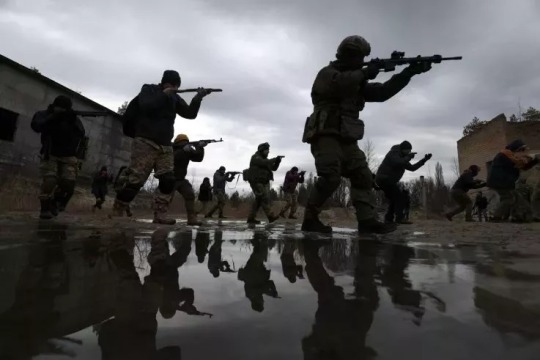
Despite repeated warnings that an invasion was imminent, many Ukrainians were shocked by the arrival of Russian troops. Here, members of Ukraine's Territorial Defense Forces participate in a drill days before the bombings began. Ethen Swope/Bloomberg/Getty
In an instant, Russian President Putin's invasion of Ukraine destroyed the post Cold War security order in Europe—one centered, to Russia's fury, by an often-expanding NATO alliance. Analysts expect that, once Kyiv falls, the military aggression will give way to a political settlement that puts a Russia-friendly government in place. By February 25, Ukrainian President Volodymyr Zelensky was considering an invitation from Moscow to hold "neutrality" talks in neighboring Belarus. If those talks happen, Putin will then be able to pull back troops and end the conflict—while having dealt the West a humiliating blow.
And that, military and Russia experts agree, may be the real point.
Ukraine, of course, is not a NATO member; the possibility that it might join the Alliance some day, as other countries that were once part of the old Soviet bloc have done, is a key issue in the current conflict. Putin's actions, a brazen defiance in the face of repeated warnings and threats of sanctions from U.S. President Joe Biden and western allies, now make it a certainty, if it wasn't before, that membership will never happen. Putin's aggression will also serve as a stark warning to countries formerly part of the Soviet Union of the possible repercussions of getting too cozy with the West.
The post Soviet status quo in Eastern Europe was one "that [Putin] never accepted," says Fyodor Lukyanov, editor in chief of Russia in Global Affairs, a Moscow-based foreign policy journal. "It ate at him. He believes Russia was treated [by the West] as a second class citizen after the Soviet Union fell."
Now, western diplomats and intelligence officials believe, Putin seeks to decapitate the western-leaning leadership in Kyiv headed by Zelensky and replace it with a government that will be loyal to "the new Tsar," as former Estonian President Toomas Ilves calls Putin. That could happen, U.S. intelligence officials tell Newsweek, within days. Putin does not want, nor does he need, to occupy the entire country to accomplish his greater goals, intelligence analysts and officials say. As Ilves puts it, "He wants a puppet state like Belarus," another former Soviet province just north of Ukraine, and from which troops poured into Ukraine as the Russian bombing ramped up. With a new reality on the ground in Eastern Europe, Ilves continues, "Putin then wants to rewrite the security rules of the road between him and NATO."
Ukraine itself appears to share at least part of that view. A statement from Mykhailo Podolyak, an adviser to Ukraine's presidential chief of staff, and shared with Newsweek by Ukraine's embassy in Washington, outlined what Kyiv suspected were Moscow's goals. "The Office of the President of Ukraine believes the Russian federation has two tactical goals—to seize territories and attack the legitimate political leadership of Ukraine in order to spread chaos and [to] install a marionette government that would sign a peace deal on bilateral relations with Russia," Podolyak said.
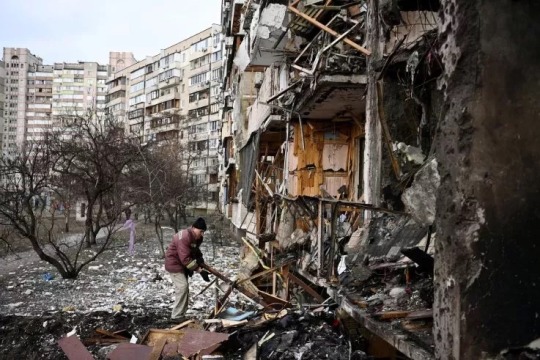
A man clears debris at a damaged residential building at Koshytsa Street, a suburb of the Ukrainian capital Kyiv, where a military shell allegedly hit, on February 25, 2022. Daniel Leal/AFP/Getty
A United States that thought it was pivoting to Asia, and focusing on China—a country that is its preeminent rival going forward—has now been dragged back to Eastern Europe, where for centuries so much blood has been spilled. Putin now has the world's full, undivided attention, in the same way that every Secretary General in the Soviet era did. In chilling televised remarks after the invasion had begun, Putin said, "whoever tries to interfere [in Ukraine] should know that Russia's response will be immediate, and will lead to such consequences that you have never experienced in your history."
Russia is now back in the limelight, a nation that is demonstrating, with a display of military might, that it remains a Great Power. Which is precisely where Putin wants his nation to be. He believes Russia should at all times command respect from the rest of the world, "and when it doesn't command respect, it should command fear," as Lukyanov of Russia in Global Affairs puts it.
Mission accomplished. As Rose Gottemoeller, former deputy secretary general of NATO and a long time Russia watcher characterized it recently on the CBS podcast Intelligence Matters, "This is [Putin's] 'look at me' moment."
The West Responds
Within hours of the invasion, the United States and its allies responded by sharply ratcheting up economic sanctions but it's unclear whether the moves will deter the Russian leader. In a speech announcing the response, Biden said more than half of the West's high tech exports to Russia would be slashed, "degrading their industrial capacity," and hurting industries like aerospace and shipbuilding. He's also freezing the U.S. assets of four additional Russian banks, including VTB, the country's second largest financial institution, whose CEO is very close to Putin. "This is going to impose severe costs on the Russian economy, both immediately and over time," Biden said.

President Joe Biden takes questions after giving an update on the Russian invasion of Ukraine on Thursday, Feb. 24 in Washington, D.C. Kent Nishimura/Los Angeles Times/Getty
The following day, the White House announced it would join the European Union in implementing sanctions against Putin personally. The Russian President is widely thought to be one of the world's richest men, allegedly hiding much of his wealth in shell companies in various tax havens throughout the world.
How effective the sanctions will be is unclear. Putin, for his part, believes he has effectively made his country sanctions-proof. Russia has over $630 billion in hard currency reserves, and rakes in $14 billion per month in oil and gas exports. As Russia's ambassador to Sweden, Viktor Tatarintsev, told Swedish newspaper Aftonbladet days before the invasion began, when the West ramped up threats of financial penalties in a futile effort to prevent military action, "Excuse my language, but we don't give a shit about your sanctions."
Biden, in his remarks the day the invasion began, said he believes Putin may have brought himself a world of trouble by invading Ukraine. "History has shown time and again how swift gains in territory give way to grinding occupation, acts of mass civil disobedience and strategic dead ends," he said. And in fact, thousands of Ukrainian civilians have been training as part of newly formed "territorial defense organizations" set up in order to resist the Russians.
But U.S. intelligence officials privately do not share Biden's optimism about "mass disobedience." One official who spoke to Newsweek on background because he is not authorized to speak on the record said, "After the government in Kyiv is dismantled, there will be no opposition within Ukraine for us to support militarily."
His pessimism is rooted in Putin's past behavior, most notably when he presided over a scorched earth campaign to brutally put down an insurgency in Chechnya more than 20 years ago. He says, "It's not realistic to mount an opposition campaign. [Putin] does not value human life the same way that the free world does, hence [Russian troops] will eradicate any opposition en masse."
Indeed, Putin's history as a commander in chief of Russia's military shows that there may be reason to doubt Biden's optimism that Ukraine will turn into a quagmire for Moscow. Beyond the ruthless campaign to put down Muslim rebels in Chechnya, he hived off the two sections of the former Soviet state of Georgia that he wanted to control in 2008. Then in 2014 he took back Crimea in Ukraine, and set up separatist movements in two heavily Russian provinces in the east, Donetsk and Luhansk. (The day before the February 24th invasion, Putin declared those two provinces were now "independent republics." )
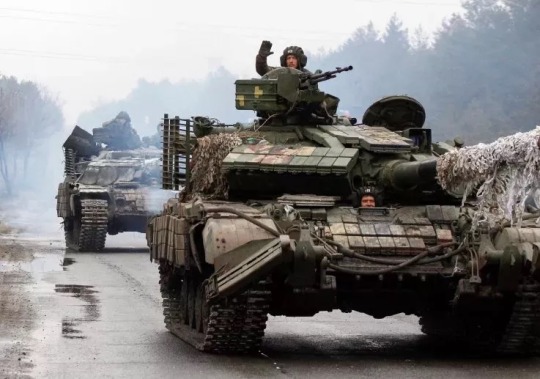
Ukrainian servicemen ride on tanks towards the front line with Russian forces in the Lugansk region of Ukraine on February 25, 2022. Anatoii Stepanov/AFP/Getty
And on the complex battlefield in Syria, where the U.S. and Russians risked conflict, former President Barack Obama funded opposition rebel groups, including some tied to Al Qaeda, then failed to enforce his own red line after President Basar Al Assad used poison gas on his enemies. Putin sent Russian troops in with one goal: that Assad maintain his grip on power. He remains in office to this day.
The Ultimate Goal
What is Putin's endgame now? The Russian leader is fueled by rage and seeks revenge against the West for his homeland's perceived mistreatment, says Peter Rough, a senior fellow at the Hudson Institute, a conservative think tank based in Washington. The country Putin grew up in, and the one he served as a KGB officer, dissolved in 1991. In its stead came chaos at home, and, in Putin's view, betrayal from abroad.
The demise of the Soviet Union, he has famously said, "was the most catastrophic geopolitical event of the 20th century" (worse, even, than World War II, in which 20 million Soviet citizens were killed). His resentment over what happened to his country, particularly in the immediate aftermath of the Soviet collapse, is more widely shared by Russians than many in the West appreciate.
As the Moscow bureau chief for this magazine in the early 2000s, I saw organized crime take over businesses large and small; the country's finances were in shambles. The government was unable to pay the salaries of a once proud military. I interviewed an Army colonel stationed on the Kamchatka Peninsula, in Russia's far east, who wept as he confessed he wasn't able to buy his wife a birthday present a few weeks earlier because he had not been paid his wages in months.
Boris Yeltsin, once the democratic hero who helped bring down the Soviet Union, had turned into a drunken mess as the first freely elected president of Russia; his inner circle was corrupt, enriching themselves as ordinary citizens struggled amidst the post Soviet chaos. On New Year's Day, at the dawn of the new millennium, Yeltsin stepped down. He was replaced by the man he had named Prime Minister months earlier, Vladimir Putin.
Twenty-two years later, in an extraordinary 55-minute speech to his country on Monday February 21, Putin aired many of his grievances in a way he rarely had publicly before, as a prelude to war. In it, he said, "Ukraine is not a separate country," and that "Ukrainians and Russians were brethren, one and the same." Kyiv, in his view, had been ripped unceremoniously from Mother Russia when the Soviet Union dissolved. He then recounted the West's early promise not to expand NATO.
He recalled how coldly then President Bill Clinton responded to his query, not long after he became President of Russia in 2000, about whether Moscow could ever be a member of NATO. He recalled, bitterly, how he was assured that NATO's expansion eastward—to include countries that had been members of the Warsaw Pact, Moscow's former client states—would "only improve their relations with us, even create a belt of states friendly to Russia.
Everything," Putin said, "turned out exactly the opposite. They were just words."

Russian President Vladimir Putin arrives to chair a Security Council meeting via a video link in Moscow on February 25, 2022. Alexeynikolsky/AFP/Getty
How does Putin seek revenge for this betrayal? To the extent he can, he wants to piece together a new Russian Empire. Not necessarily every province of the former Soviet Union, but those parts of the pre-Soviet empire, established by the Tsars, who were largely Russian speaking, orthodox Christian and who looked first to Kyiv, and then later to Moscow, as the political, cultural and spiritual center of the world.
Putin is a nationalist first and foremost. Ukraine, plainly, is central to this vision. But it also includes the countries—former Soviet provinces—that are now effectively Russian client states (Belarus), as well as those Moscow wishes to control yet again: the Baltic states of Lithuania, Estonia and Latvia (the latter three are now members of NATO, for whom the alliance is obligated to fight in the event one of them is attacked.) Putin in his pre-invasion speech said it was "madness" that the Baltics were ever allowed to leave the USSR. He has demanded—preposterously—that the Alliance pull back to its 1997 stance, when there were just 16 members, as opposed to 30 today.
Point, Counterpoint
It is for that reason that Biden is moving more NATO troops and materiel into the Baltics. On February 25, NATO Secretary General Jens Stoltenberg said the Alliance would for the first time dispatch troops from the Spearhead Unit of its so-called Response Force—formed in 2014—to member states along the eastern front. NATO describes the Response Force as ''highly ready and technologically advanced." It consists of 40,000 troops from a variety of NATO countries. Stoltenberg declined to say precisely how many troops would be deployed now.
More deployments are likely in the months ahead. President Biden vowed in no uncertain terms that an attack on a NATO member would trigger Article 5, the provision that maintains any armed attack against one country in the Alliance is considered an attack against all. If Putin moves on the Baltics, or on any NATO members who formerly were part of the Warsaw Pact—like Poland, Romania or Bulgaria, all of which border Ukraine—then Moscow will be at war with NATO.
With the invasion of Ukraine, analysts believe, Putin hoped to shake NATO. He wanted, says Douglas Wise, a former CIA officer and deputy director at the Defense Intelligence Agency, "to further divide our allies, and cement existing fissures and disunity within [the Alliance] and the EU. He also believes he can benefit by humiliating the Western leaders and institutions when they fail to develop credible and practical options to counter his aggression."
Whether Putin benefits at home for his audacious attack on Ukraine is not yet clear. (There were small protests in major Russian cities in the immediate aftermath of the invasion.) But if creating more stress on NATO was one of his goals, that failed.
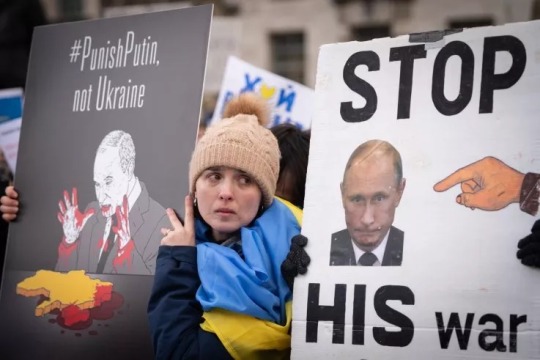
Ukrainians hold a protest against the Russian invasion of Ukraine outside Downing Street, central London. Stefan Rousseau/Getty
The Germans were widely viewed as the weakest link when it came to Russia, because of the two countries' significant trade ties. And at the outset of the crisis, that skepticism seemed justified. Early on, for example, Estonia wanted to send a batch of old howitizers in its possession to Kyiv. But NATO regulations say that any weaponry given or sold to a non-NATO member must be approved by the country of origin. In this case, that country did not exist: The howitzers had been in possession of the old East Germany. Upon unification, Germany took control of them and ultimately passed them on to Finland, who eventually gave them to Estonia. When Tallinn wanted to send them on to Ukraine, to do its bit to help shore up Kyiv's defenses, Germany—astonishingly—declined to approve the transfer.
That was followed by Berlin's deep reluctance to stop the Nord Stream 2 natural gas pipeline linking Germany and Russia, despite pressure to do so from its own ambassador to the U.S., Emily Haber. Following the refusal, Haber wrote a widely publicized cable to new Chancellor Olaf Scholz, saying that the country was gaining a reputation as a bad ally.
To Putin, this must have indicated that his gas-politik was paying huge dividends. But it didn't last long. Scholz visited Washington in early February and, in a post meeting press conference with Biden, stood by meekly as the president asserted that Nord Stream 2 was dead if Moscow took military action against Ukraine. On cue, hours after the invasion began last month, Germany halted certification of the $11 billion project.
In fact, far from deepening fissures within the alliance, Putin's Ukraine gambit has had the opposite effect. Former CIA Director and Army General David Petraeus, upon returning from the Munich Security Conference shortly before the invasion, said he had never seen the Alliance so unified since the days when he served at NATO headquarters during the Cold War.
The evident unity among the members of what Biden accurately called the most powerful military alliance in history, has only made the plight of Ukraine more poignant. As the invasion unfolded, a member of the Ukrainian parliament in Kyiv, Alexey Goncharenko, begged NATO to impose a no-fly zone, to allow his countrymen to have a fairer fight on the ground. There was zero chance of that happening, because Kyiv wasn't in the club.

Ukrainians flock to the train station to leave capital Kyiv after Russian military intervention in the country in Kyiv, Ukraine on February 25, 2022. Wolfgang Schwan/Anadolu Agency/Getty
Soon now, its desire to be part of the West will be moot, as Putin's Russia takes control—little more than 24 hours after the invasion began, Russian forces were already entering the the capital and Kyiv was hit with Russian "cruise or ballistic missiles." Success is inevitable because Biden and the allies have made it clear that Moscow will not meet military resistance from the West. Over and over Biden has told the American people the U.S. will not fight on the ground in Ukraine. He knows the public has no stomach for it.
If events play out as military analysts now expect, the conflict will end relatively quickly with a negotiated settlement that may cede some territory to Russia, the installation of a new Russia-friendly regime in Kyiv and a partial withdrawal of troops that allows Putin to avoid the quagmire the West so badly wants him sucked into. In doing so, Putin will be able to claim that he dealt a devastating setback to NATO, the main goal of his aggression.
For Putin, the sack of Ukraine will likely mark the endgame in his desire to restore the empire. If it doesn't, it will mean at some point the world's two largest nuclear powers will be in a shooting war, with all the risk that entails. With his words and more importantly his actions, Biden is frantically signaling to Putin: this far, but no further. An anxious world hopes the Russian leader, satisfied with victory in Ukraine, will get the message.
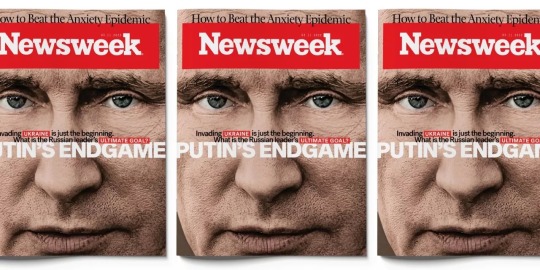
0 notes
Text
Beyond Ukraine, plenty of issues for Biden-Putin talks
Beyond Ukraine, plenty of issues for Biden-Putin talks
WASHINGTON (AP) — Russia’s military buildup on the border with Ukraine will be the top focus of talks between President Joe Biden and Russia’s Vladimir Putin on Tuesday, but there are plenty of other thorny issues on the table as well, including cyberattacks, human rights, and US-Russian relations that a Kremlin spokesman says are overall in “a rather dire state.”
Fyodor Lukyanov, a leading…

View On WordPress
0 notes
Text

Surprised right? Computer on Water? Well, it is true. In the year 1936 scientist Vladimir Lukyanov built a computer that could only solve partial differential equations and had complex interconnected tubes filled with water. It is still preserved in the Moscow Polytechnic Institute for the Tourists and when you go there don’t forget to visit the Water Computer once.
For more such amazing knowledge and facts about Technology, your destination is https://iraitech.tumblr.com/
#didyouknow#facts#fact#knowledge#didyouknowfacts#factsdaily#dailyfacts#funfacts#knowledgeispower#amazingfacts#generalknowledge#interestingfacts#science#factz#instafacts#truefacts#factsoflife#india#allfacts#sciencefacts#doyouknow#gk#realfacts#instagram#education#factoftheday#coolfacts#didyouknowthat#iraitech#ThrowbackThursday
0 notes
Text
Round table: "Actual problems of security and strategic stability"
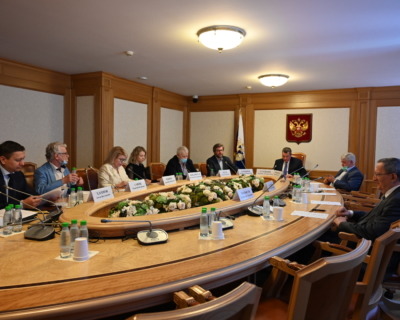
The International Affairs Committee held a round table on May 17 on the topic: “Actual problems of security and strategic stability.” Members of the committee, as well as leading experts in the field of strategic stability, took part in the meeting – Chairman of the Presidium of the Council for Foreign and Defense Policy Fedor Lukyanov, Scientific Director of ISCRAN Sergey Rogov, Director of the Center for Energy and Security Vladimir Sazhin, Ambassador Extraordinary and Plenipotentiary of the Russian Federation to Iran in 2001-2005 Alexander Maryasov.
The discussion touched upon aspects of Russian-American relations, including in the context of a possible meeting between the Presidents of the Russian Federation and the United States, as well as the problems of cooperation with Iran and China.
https://interkomitet.com/press/committee-news/round-table-actual-problems-of-security-and-strategic-stability/
0 notes
Photo
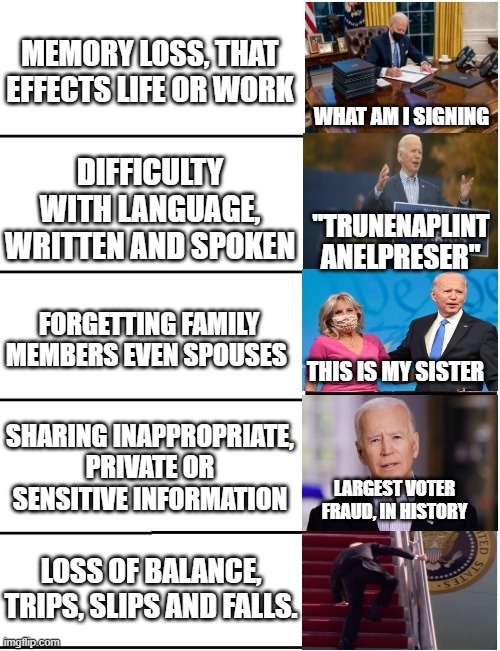

Russia Freezes Relations With America As “Biblical” Surge In Food Prices Becomes Global Crisis
By: Sorcha Faal,
A comprehensive new Security Council (SC) report circulating in the Kremlin today first noting the warning issued by the Ministry of Defense (MoD) that US-backed Islamic militants are plotting a provocation using toxic agents in Syria’s Idlib Province, says this warning quickly followed Syrian Minister of Oil and Mineral Resources, Bassam Tohme, revealing that the total losses in the direct and indirect oil sector in Syria have exceeded $92-billion due to the Americans and their followers acting as pirates in targeting Syrian oil wealth.
A warning and revelation that in past normal times would have initiated urgent diplomatic and military talks between Russia and the United States to forestall an escalation towards war—but due to Supreme Socialist Leader Joe Biden refusing to hold a live televised talk with President Putin in front of the world to explain his dangerous and unhinged war rhetoric, sees this option being no longer available—and though after his refusal Biden said “I’m sure we’ll talk at some point”, this will never happen as President Putin has accepted the guidance of top Russian diplomatic expert Fyodor Lukyanov to immediately freeze all relations with the United States as any further engagement with Biden is pointless for now—with Lukyanov exactly advising President Putin:
Recalling Russia’s ambassador back to Moscow for consultations was a natural step – but that’s not enough.
A more reasonable approach would be to freeze Russia-US relations with the exception of some essential ‘technical-level’ aspects. Most importantly, we must prove the US wrong in its conviction that it can act recklessly in all but every aspect of diplomacy while maintaining a useful level of interaction in areas that are important to American national interests.
No, Mr. Biden, you cannot walk and chew gum at the same time. Today, we don’t see any of that ‘serious’ or ‘long-term’ attitude. And we watch the pillars of strategic stability (which used to be the foundation of stability in general) undergoing erosion before our very eyes.
The dialogue that has been expanding (or shrinking) over the last few years was not producing any new agenda – it was destroying the existing one. The system of international relations is undergoing a truly fundamental shift, the result of which remains unknown. Caution should be exercised.
Yesterday, to further notice, Russian Ambassador to the United States Anatoly Antonov thanked the US citizens who had sent to the Russian Embassy letters expressing support for friendly Russian-US relations and apologizing for Washington’s ill-considered moves towards Moscow, with his stating: “I am deeply touched by the caring and active position of ordinary Americans who understand that dialogue between our countries should be based on mutual respect and equality…This approach of US. citizens indicates that a potential for normalizing ties between the peoples of Russia and the United States is still there...I hope that the Administration will heed the voices of the voters and discontinue its course aimed at further devastation of the already excessively confrontational relations”—and saw this statement of thanks being followed by famed American conservative news host Candace Owens posting a Tweet to her nearly 3-million followers saying: “I am asking ALL of my followers to RETWEET this: For obvious mental health reasons, @JoeBiden has declined a public discussion with @KremlinRussia…I would like to publicly invite Vladimir Putin sit down with me for a wide-ranging interview on @thecandaceshow”.
Mental health issues Biden further displayed yesterday when he couldn’t even walk up the stairs of Air Force One without falling over THREE times, though most dangerously he put on full display for the Communist Chinese—a shocking display of mental illness that began when a deranged sex addict gunned down 8 innocent people in Atlanta-Georgia, 6 of whom were Asian women, because he wanted to “eliminate temptation”—saw FBI Director Christopher Wray confirming that this vile killing had nothing at all to do with race—but then saw mentally ill Biden ignoring this reality to claim this killing was racially motivated and saying “We Cannot Be Complicit”—after which his second-in-command socialist leader Kamala Harris, standing right beside him, astonishingly declared “Racism is real in America, and it has always been”.
Occurring at the same time Biden was putting on this full display of mental illness to change reality; his top diplomats were holding the first meeting with their Communist Chinese counterparts in Alaska—a meeting wherein even the leftist Washington Post had to honestly report “the Biden administration gets a taste of China’s ‘wolf warrior’ diplomacy”—saw the Chinese saying their meeting with Biden’s diplomats had a “Strong Smell of Gunpowder and Drama”—then saw the Chinese directly telling Biden: “The US Does Not Have the Qualification to Speak to China From a Position of Strength”—and to the true and lasting damage mentally ill Biden has wrought on his own country this week alone, sees it being best described in the article “Biden and Blinken’s Unprovoked Attacks On Russia And China Backfire...Because If You Live In A Glass House, Don’t Throw Stones”, that says: “The collapse of what passed for a coordinated position of diplomatically confronting both Russia and China has left the US scrambling to navigate through the detritus of its own policy shipwreck”.
Included in the shipwreck of mentally ill Biden’s failed policies, it bears noticing, is the COVID vaccine disaster being caused by unproven mRNA vaccines using nanoparticle-protected live viruses—which unlike Russia’s first in the world Sputnik V and Johnson & Johnson’s dead virus vaccines long proven safe over decades of use, keep killing people—deaths occurring in people taking the AstraZeneca vaccine using mRNA live viruses, that Norwegian researches have discovered provoke a “strong immune response” causing deadly blood clots—a shock discovery confirmed by German scientists, who then said the AstraZeneca vaccine can cause thrombosis in the BRAIN in “rare” cases.
With Finland suspending the AstraZeneca vaccine despite European regulators saying it is safe and effective, it bears grim notice that the European Commission warned yesterday that a third wave of COVID-19 is “on the horizon” in Europe—a warning that was quickly followed by German Health Minister Jens Spahn stating that there are not enough vaccines in Europe yet to stop a third wave of the pandemic—all of which is coming at the same time it’s further being warned that this pandemic may have left over 250-million people with acute food shortages in 2020.
Today, in fact, South Sudan faces life-threatening food shortages as its harvests fall by 50%, and both Lebanon and Myanmar have run out of food—though to fully comprehend the historic magnitude of this growing global crisis, one need only read the seemingly innocuous report “Food Price Surge Is Unlikely to Revert”—a report released this week by the Dutch multinational banking and financial services giant Rabobank, that is the global leader in food and agriculture financing and sustainability-oriented banking—but whose beyond fearful findings are being described in articles like “On The Verge Of A Global Crisis: One Bank Warns Of A “Biblical” Surge In Food Prices”.
On the day Rabobank released their actual food price doomsday findings, Russia was able to announce that it become a net exporter of food for first time in post-Soviet history—and to protect the Russian people, the Kremlin introduced an export limit and a tax hike on exports of grains in an effort to keep excess supplies at home to prevent domestic food prices from rising.
With the entire South Western growing region of the United States experiencing one of its worst droughts in history, however, Biden further displayed how actually mentally ill he is by signing into law the socialist monstrosity called a COVID relief bill—wherein is buried “Section 1005”, which astonishingly bans all white farmers in America from receiving US government aid---and for what these unsuspecting Americans living under tyrannical socialist rule can expect in the near future, should see them urgently reading and heeding such warning articles like “’Things Are Out Of Control’ - There Is A Shortage Of Everything And Prices Are Soaring: What Happens Next”. [Note: Some words and/or phrases appearing in quotes in this report are English language approximations of Russian words/phrases having no exact counterpart.]
American people to experience the greatest food price crisis in history while being led by an actual mentally ill socialist idiot.
0 notes
Text
Anyone else see that TIL about Soviet Aquarium Computers? via /r/Anarchism
Anyone else see that TIL about Soviet Aquarium Computers?
"The Water Integrator was an early analog computer built in the Soviet Union in 1936 by Vladimir Sergeevich Lukyanov. It functioned by careful manipulation of water through a room full of interconnected pipes and pumps. The water level in various chambers (with precision to fractions of a millimeter) represented stored numbers, and the rate of flow between them represented mathematical operations. This machine was capable of solving inhomogeneous differential equations.
A water integrator was used in the design of the Karakum Canal in the 1940s, and the construction of the Baikal–Amur Mainline in the 1970s. Water analog computers were used in the Soviet Union until the 1980s for large-scale modelling. They were used in geology, mine construction, metallurgy, rocket production and other fields."
https://en.wikipedia.org/wiki/Water_integrator
A simple (relatively) machine that could be diagnosed and repaired as needed, as opposed to modern electric ones that just have to be scrapped when the magic smoke escapes.
I used to rebuild screw-machines before COVID layoffs. 1890's tech that's still used today due to how durable and reliable they are. Just about anything you'd spend less than $8 on in a hardware store was probably made on a screw machine.
Capitalist-apologists are absolutely correct that we wouldn't have the technology we do today if not for Capitalism, but we have no idea what technology we would have without it.
Imagine what other kinds of computers would have been invented when it became clear that creating sillicone circuit boards was extremely deadly to pretty much every worker involved. If we only worked to create comfortable conditions, what sort of tech would we have?
(Apologies for the unfocused ramble, but I've been completely burned out the past few...fuck, idk. But I'm an Anarchist because I believe in a better future, and for the moment I just want to imagine that future and talk about what could be, or could have been)
Submitted October 29, 2020 at 04:07AM by Dythiese
via reddit https://ift.tt/3edIkwz
0 notes
Photo

Tech Fact #91 Russia built a computer that ran on water: in 1936 Before the miniaturisation of transistors, computers had a much more visible system of counting: things like gears, pivots, beads and levers were often used and they needed some sort of power source to function. Vladimir Lukyanov built something like this in 1936 but he used water to create a computer that solved partial differential equations. In images of the Lukyanov computer, you'll see a complex system of interconnected tubes filled with water. Visit our website for the latest tech news, gadgets updates and reviews. [Link is in our bio] Follow #TechSavvy on ▪️🌐: https://www.attechsavvy.com ▪️Insta: @techsavvy.in ▪️Facebook: facebook.com/attechsavvy ▪️Twitter: techsavvy_in #phones #technews #allthelatest #technology #india #gadgets #latestnews #gamingnews #Gadgetsreview #techfacts #techfact #techhacks #techtricks#techsavvytechfacts https://www.instagram.com/p/CFrjbdMBcMG/?igshid=11zv9px0rpfqo
#91#techsavvy#phones#technews#allthelatest#technology#india#gadgets#latestnews#gamingnews#gadgetsreview#techfacts#techfact#techhacks#techtricks#techsavvytechfacts
0 notes
Text
El ordenador soviético que funcionaba con agua en vez de electricidad
Mucha tecnología e innovación se han tenido que dar para que hoy en día tengamos chips de 5 nm con millones de transistores en apenas unos milímetros de superficie. En las primeras etapas de la computación, cuando los ordenadores ocupaban habitaciones enteras, un ingeniero soviético diseñó uno que funcionaba, literalmente, con agua. Estamos hablando de Vladimir Lukyanov y su integrador de agua.
etiquetas: ordenador, soviético, urss, agua, integrador, vladimir lukyanov
» noticia original (www.xataka.com)
0 notes
Text
Well-Connected Policy Intellectual Lukyanov: Russia Does Not Have To Interfere In Belarus ...
New Post has been published on https://armenia.in-the.news/politics/well-connected-policy-intellectual-lukyanov-russia-does-not-have-to-interfere-in-belarus-38901-23-07-2020/
Well-Connected Policy Intellectual Lukyanov: Russia Does Not Have To Interfere In Belarus ...
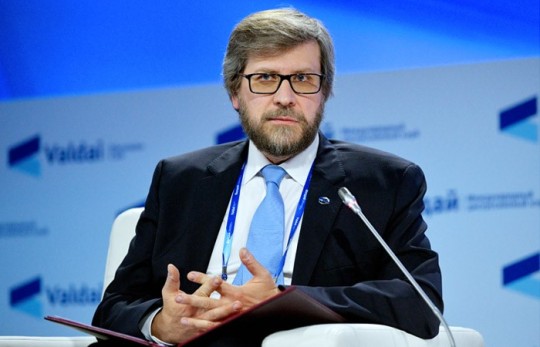
Fedor Lukyanov, Editor-in-Chief of Russia in Global Affairs, and one of Russia’s foremost policy intellectuals, sat down for an interview with Alexey Solomin on Echo of Moscow radio station that covered many foreign policy areas. Lukyanov was blasé about the Belarus elections as that country has nowhere to go but Russia. The main task of diplomacy in the conflict between Armenia and Azerbaijan is to avoid all-out war, as a negotiated compromise was not in the cards. China was a challenge and not a threat to Russia and particularly in terms of territorial expansion. Erdogan turned Hagia Sophia in Istanbul back into a mosque, because he is an Islamist and not because he sought to irritate Russia. Russia’s military may be fond of Khalifa Haftar, but Russia is not committed to anyone in Libya. Excerpts from the Lukyanov interview, with Solomin’s questions in bold type, follow below.[1]

Fedor Lukyanov (Source: Interfax.ru)
― […] I would like to start with Belarus. An acute situation there arose after the CEC [Central Election Commission] refused to register opposition candidates. What, from your point of view, is real Alexander Lukashenko’s rating in the country now?
― […] I can’t judge what his real support is. We have polls, which give diametrically opposed results: the official ones show 80% [support]; oppositional ones show only 3%. I do not think that either of the two corresponds to reality. By the atmosphere, and collating different facts, we can assume that, of course, the real support is lower than of that President Lukashenko is used to.
And the campaign is going very stressfully. We observe this … I have little doubt in a result of these elections. But what will happen next… I think that very difficult times are in store for Alexander Lukashenko, because during this campaign it turned out that he is opposed and has a major beef with Russia and even tries to exploit the “Russian factor” that allegedly has a role in his election campaign.
But he has nowhere else to go. However after the elections have proceeded and concluded, the same set of question on which Russia and Belarus have been clashing for a minimum of a year and a half to two years will resume on everything that is related to the so called union state in its new meaning. But in general, Alexander Grigorevich’s space for maneuver is narrowing although he is a skilled player and a very strong fighter….
― […] I would like to know about Russia’s position. Does [the Kremlin] want Lukashenko to be the president for a new term?
― Russia, it seems to me, this time is in a perfect position. Russia does not have to do anything…
― Just observe.
– Just observe: In Russia, Lukashenko is hardly a favorite candidate …. If it were a different country and a different leader, all those words that were addressed to Russia over the past year and a half, would not have been left without a resolute response…but it is clear that Lukashenko does not enjoy the warm affection that he previously enjoyed in Moscow …
― So why is he [Lukashenko] forgiven this. You said that the things that he uttered towards Russia, would not have been forgiven if they were said by someone else?
― [The Kremlin] has a very long history of relations with him. After all, Alexander Lukashenko has been in power for 26 years. So on the one hand, they just got used him. On the other hand, there is an understanding that, in general, he and the Republic of Belarus have no other options. Economic ties [between Russia and Belarus] are so close and deep that it is impossible to change them without catastrophic consequences for Belarus…
― […] Does any of Alexander Lukashenko’s rivals carry a “Kremlin mark”?
― Almost no opponents nor remain for Alexander Lukashenko. I doubt that one of them has a Kremlin mark…Perhaps your listeners will not believe it but Russia has no special need to interfere in the Belarus campaign… the previous trend [in Moscow – Minsk relations] will remain: a gradual forcing of Belarus to a new closer relations and economic ties. If somehow this will not happen, then, I repeat once again, the space for maneuvering for any Belarus leader of is very narrow…
― […] Before the amendments to the Constitution, political scientists discussed at a serious level the possibility of the union super state [of Russia and Belarus] … supposedly Vladimir Putin could be the head of this state after the end of his presidential term. Is this project completely discarded today…?
– …Even if there is an idea that Belarus needs to be integrated in some way, this has nothing to do with the prospects of Vladimir Putin. Because Vladimir Putin is an experienced politician and has been in this business for a long time… to make his future dependent on relations with another country, especially with the complicated relations that developed with Belarus, would be short-sighted from his perspective…
― […] Aggravation of the conflict between Armenia and Azerbaijan… what triggered to this escalation?
― Well, this, in general, does not matter. It could have been an accident, or it could have been a desire to check the enemy’s readiness… conflicts, incidents in such cases and in such zones erupt, are programmed. The next question is always a desire and ability to stop this escalation… And the incident is difficult, because there are a lot of victims. On the Azerbaijani side, the casualties are very significant: a general got killed and senior officers.
And given the existing tension in both societies (in Azerbaijan in particular), this is a very sore subject …. It is obvious, that Azerbaijan accumulated strong resentment and dissatisfaction with the situation. This is a rather complicated issue for the Azerbaijani leadership, because it is impossible to change anything radically.
If, God forbid, a full-blown conflict breaks out, no one of the external players will allow it to develop…
― [Recently] Polad Bulbuloglu, the Azerbaijani ambassador to Russia, said, that 10 million people [in Azerbaijan] cannot wait 30 years for 2.5 million people [Armenians] to live the occupied territory… Do you think that the rhetoric of the Azerbaijani authorities indicates a readiness for a military solution?
― No, I do not see any readiness for such actions. This rhetoric is being repeated regularly… the Azerbaijani leadership is very experienced and they are well aware that the 10 million people, of course, cannot wait, but they have to. And in this regard, changing the status quo by military means, in my opinion, is in principle impossible. And the point here is that a certain balance has developed. Azerbaijan had quite an unsuccessful military experience, and [we shouldn’t forget about] external factors. Russia is a military ally of Armenia. Naturally, Russia doesn’t not want to get into a situation where it would have to defend one of its important partners (via military means) again another of its important partners. Armenia is a formal ally, and Azerbaijan is simply an important country for Russia…
― The political leadership of Azerbaijan bears certain risks if it fails to convince its people that this issue will be resolved somehow?
― Of course… This is also true for Armenia. The economic situation in Armenia, as I understand it, is rather difficult, the pandemic struck the country quite painfully. Therefore, both countries need some positive stories…
― The Karabakh problem has indeed lasted about 30 years. Can you recall a period when the parties were at least a little closer to a compromise solution? …
― […] There was once a period of very intense diplomacy. If I remember correctly, when Dmitry Anatolyevich Medvedev was the president of Russia, he devoted a lot of time [to this issue], he met with Aliyev and Sargsyan several times. And really put a lot of effort into it… Anyways, there has been no war in Karabakh since the mid-90s. But I am afraid that there is no chance to achieve anything through negotiations… the idea that Azerbaijan unlawfully lost territories, which must be returned, is rooted in the Azerbaijani political narrative. And in Armenia, respectively, the opposite is true – “Karabakh being a part of Azerbaijani was the historical injustice, which was corrected, and we won’t let it be changed.” …
― Do I understand correctly, that a compromise is impossible?
― The compromise, of course, implies concessions. Today I can’t imagine what could be done. For external mediators … maintaining a balance and the prevention of war is the main direction of diplomatic efforts. In fact, no one seriously expects that in some historical perspective we will be able to resolve this conflict.
― […] So, from your point of view, did Nikol Pashinyan’s rise to power in Armenia give hope that the Karabakh issue would be changed in a positive way?
― In my opinion, no, because, as I said before, this issue is not connected with personalities… the previous two presidents of Armenia were both natives of Nagorno-Karabakh, veterans of the Karabakh war. And, of course, during their presidency, in principle, the conversation could not even start… he [Pashinyan] has nothing to do with this Karabakh region, it would be very difficult for him, even if he wanted to, to make a decision that could affect the status of Karabakh…
― The Armenian ambassador Vardan Toganyan drew attention to a statement made by Turkey. Turkey supported the Azerbaijani side. Is there Turkish influence? And if so, how strong and important is it?
― […] Turkey now has its own problems. The fact that Turkey is a close ally of Azerbaijan is not news at all. The fact that Turkey cannot settle relations with Armenia because of Karabakh is also a fact… I think, Turkey will certainly fully support Azerbaijan rhetorically. Will it intervene in other ways? I think not.
― Lets move the conversation to other neighbors. After the words of Deputy Prime Minister Alexei Reznikov, talks began about a possible Ukrainian withdrawal from the Minsk agreements. Dmitry Kozak already commented on this issue: “Russia expects some more clear statements on this subject.” From your point of view, is Ukraine really going to quit these agreements?
― I do not think anyone wants these agreements to end. Just for one simple reason: there is no legal basis between Russia and Ukraine for dealing with the well-known problem of the East of Ukraine, except for the Minsk agreements… The Minsk agreements create a sort of a framework for the political and diplomatic process. Even if this process doesn’t go anywhere…
Theoretically, Ukraine can leave Minsk agreements, it has every right to do so. In that case the peace process will freeze in an incomprehensible and very dangerous form. Because there would be no basis [for negotiations] at all. Conflict, in principle, can flare up again it will take only one provocation ….
― Does this mean that these documents should be at least revised in order for them to work?
― Revision in this case is impossible, because we must remember the circumstances under which these agreements were signed… there was an agreement to end the war, which was very brutal at that time. And in fact, those points, which are being disputed now by the Ukrainian side (and, in particular, by comrade Poroshenko), were signed by him precisely in order to stop a very difficult conflict… To reach some sort of revision, which would suit everyone is simply impossible… I believe that any revision can only happen, through an outbreak of a military conflict. But no one is interested in this. God forbid that this should happen.
― […] Let’s talk about a different topic … What the Far East means for Russia? Some compare the Far East with the colonies of an empire. Some say that Moscow actually has long lost control of this region, and this region is very economically dependent on the countries that border it. Do you think this is true? …
― […] I think that this metaphor, that the Far East supposedly has always been a colony, is false. Because in a colony there is always a colonized population and some kind of community that becomes an alien population… As for the Far East dependence upon the neighboring countries, it certainly exists, but not to such an extent that one could say that Moscow does not influence this territory anymore…
The question, it seems to me, is different… For the last 10 years Russia has intensified its policy of the so-called “turn to the East”, that is, to intensify its presence in Asia… This turn is going on rather “creakily”, but, nevertheless, is taking place. This is a large federal, state-wide project, which is associated with the Russia’s position in Asia. But the inhabitants of the Far East, of course, have their own needs, aspirations and demands … Now, as those people do not really feel the results of this policy, this apparently, frustrates the population …
― It is just, that in this connection, some suggest that there is a risk of Moscow losing the Far East. The more entrepreneurial (for example the same Chinese) who are economically very strong, will influence the region.
― […] According to my not very qualified estimates, this is quite exaggerated. There is no doubt that the Chinese, of course, see all of Asia and all of Eurasia as a potential space for their entrepreneurial efforts. But some sort of an assault, in my opinion, is impossible… Is China a threat? China is, as people like to say now, a challenge. It’s different … to imagine that China will want a piece of Russian territory is unimaginable. China has completely different tasks, completely different problems, especially now, when their confrontation with the United States resembles a real Cold War.
… of course, I agree with many colleagues, who say that for the coming decades there will be no more important task for Russia than building positive, constructive working relations with China, which at the same time would not make Russia dependent on China.
― […] You mentioned a serious conflict between China and the United States. Please rate the likelihood of an open military conflict between the two countries. How real is it today?
― Today, this is completely unrealistic. No one can imagine such a scenario … in the current situation it is simply impossible, because the losses of the parties involved will be huge, and the interdependence of China and the United States remains extremely high.
In addition, at the moment, the United States is controlled by a man who is not a warrior at all. That is, Trump prefers any other means of influence and pressure, but not military ones. China also does not feel ready, as it seems to me.
[…] In addition, both countries are powerful nuclear powers. America is a superpower, China is just a nuclear state, but it has the means to “respond” [to the US].
Now, the main front of confrontation between China and the United States is not a military one. It is the economy: there were technological opportunities that China has actively used in recent years, and now the US is trying to stop them. This is a rather fierce and serious battle… This aggravation is extremely unnerving, for most Asian countries, especially for the region of Southeast Asia. All Southeast states, in general, have benefited a lot from the previous era of globalization, when China and the United States worked harmoniously within the framework of global economy… This [conflict] will lead to dramatic changes in the world. So far, no one can even understand what those changes might be.
― […] Let’s get back to Turkey. There are two topics: the first one is related to the Hagia Sophia. Do you think these actions by the Turkish leadership irritate Moscow? …
― Well, I think that it caused some frustration in Kremlin. Especially for those who view religion as an important topic. But in general, the whole hype around this topic (not only in Russia, but around the world) surprised me… Erdogan is an Islamist. He came to power as an Islamist. He was always a very deeply Muslim. His actions in this regard, I think, are fully consistent with his beliefs.
In addition, Constantinople fell [to Turks] around 500 years ago. And, I’m sorry for the cynicism, but maybe it’s time to get used to the fact that Hagia Sophia is not an Orthodox church. Actually, until 1934 it was a mosque. These are the internal dynamics of Turkey, … this is Turkish territory and Turkey’s building too. Therefore, one can be indignant, but, strictly speaking, there is no ground for the claims.

Erdogan in Hagia Sophia acting upon his beliefs (Source: Dailysabah.com)
― From your point of view did Erdogan want to offend Russia?
― I think that in this issue he wasn’t even thinking about Russia. This is in general a domestic policy of Turkey…
― Another topic related to Turkey is about Libya. Do you think there is now an understanding of how this conflict is developing? The Libyan forces (the parliament that supports Haftar) are calling on Egypt to become a party to this conflict.
― Egypt is already a participant in this conflict… it seems to me that, firstly, Russia is not the main player in this conflict… Turkey plays a key role, Egypt and the United Arab Emirates play a key role… By and large, Russia does not have any important interests there…
― You are talking about Russia’s distancing from the parties to the conflict. But Turkish President Recep Erdogan accuses Russia of using Wagner PMC in Libya.
― Russia might be using Wagner PMC, or Wagner PMC might be using Russia to earn money there under the Russian flag. I do not know. But the fact is, that Russia is present in this conflict. It is true that there are many in Russia (especially among the military) who sympathize with Haftar.
But Russian politics in this case is really quite diversified. Russia does not have any kind of strict obligations to any of the participants…
[1] Echo.msk.ru, July 15, 2020.
Read original article here.
0 notes